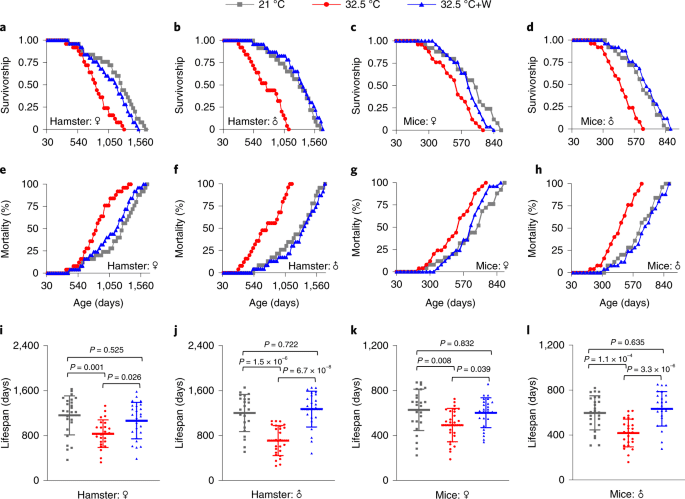Mito
Member
- Joined
- Dec 10, 2016
- Messages
- 2,554
Abstract
The relationships between metabolic rate, body temperature (Tb), body composition and ageing are complex, and not fully resolved. In particular, Tb and metabolic rate often change in parallel, making disentangling their effects difficult. Here we show that in both sexes of mice and hamsters exposure to a temperature of 32.5 °C leads to a reduced lifespan, coincident with lowered metabolic rate and elevated Tb with no change in body composition. We exploit the unique situation that when small mammals are exposed to hot ambient temperatures their Tb goes up, at the same time that their metabolic rate goes down, allowing us to experimentally separate the impacts of Tb and metabolic rate on lifespan. The impact of ambient temperature on lifespan can be reversed by exposing the animals to elevated heat loss by forced convection, which reverses the effect on Tb but does not affect metabolic rate, demonstrating the causal effect of Tb on lifespan under laboratory conditions for these models. The impact of manipulations such as calorie restriction that increase lifespan may be mediated via effects on Tb, and measuring Tb may be a useful screening tool for putative therapeutics to extend the human lifespan
Body temperature is a more important modulator of lifespan than metabolic rate in two small mammals - Nature Metabolism
Zhao et al. uncouple the effects of body temperature and metabolic rate on lifespan in two rodent models, showing that in warm conditions, where body temperature is elevated and metabolic rate reduced, lifespan is reduced. Reversal of increased body temperature reverses the negative impact of...

